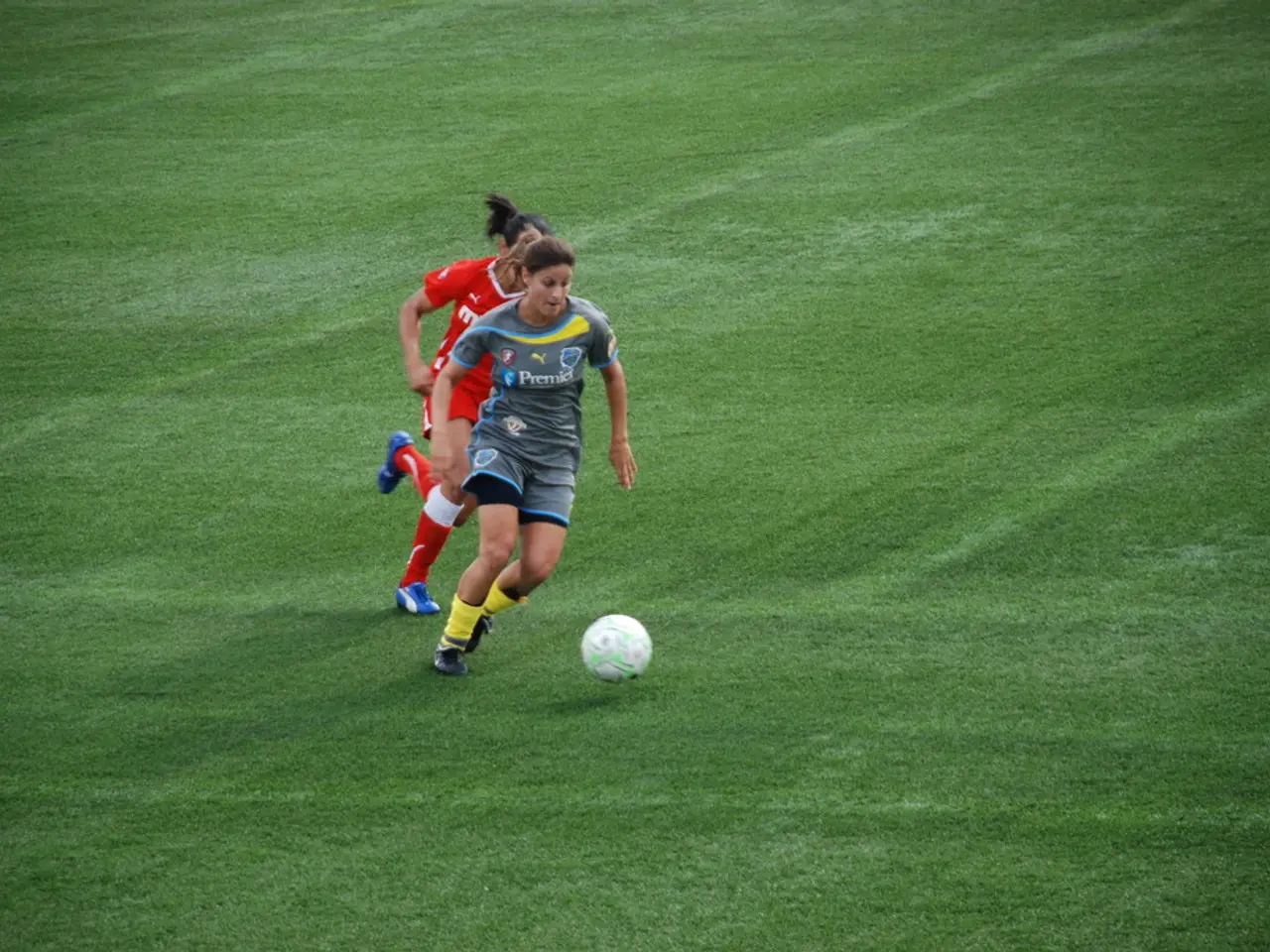Struggling within their homeland, Nigerian female athletes shine internationally.
In a nation where the Super Falcons, Nigeria's women's football team, have won the Women's Africa Cup of Nations (WAFCON) an impressive 10 times and the Women's AfroBasket for the fifth consecutive time, a significant disparity exists between the pay of female athletes and their male counterparts[1][3][4]. This discrepancy is largely due to systemic mismanagement, underfunding, and entrenched gender biases[1][3][4].
The Nigerian Football Federation (NFF) justifies the unequal pay by claiming that men's teams generate more revenue or sponsorship. However, this assertion is contradicted by the women's teams' significant contributions to the nation's prestige through their numerous titles[1][4]. Additionally, the pay structure for women often relies on inconsistent per-match bonuses, unlike the more stable remuneration enjoyed by men's teams[1].
Female athletes who speak out against these disparities face severe consequences. They risk being blackballed from competitions or having their careers jeopardized if they publicly challenge unequal pay or poor treatment[1]. For instance, Desire Oparanozie, a former captain of the Super Falcons, led protests over unpaid wages at the 2019 Women's World Cup and was subsequently stripped of her captaincy and not called up for the 2022 tournament[3].
The Super Falcons have staged strikes and threatened boycotts multiple times over unpaid wages and bonuses dating back years, but these efforts have often been met with little long-term resolution[3]. This fear of backlash enforces a climate where female players keep a low profile on gender pay issues despite their frustration.
While Nigeria has offered gestures like rewards and bonuses to women's teams after victories, critics argue these are one-off and fail to address the systemic issues requiring sustainable investment, equal pay policies, and better institutional support[4][5].
The situation is not limited to the Super Falcons. Both the women's basketball and football teams have faced issues with late or unpaid match bonuses for years[1]. In 2021, the basketball team protested against unpaid match bonuses, while the Super Falcons played a limited number of test matches before the WAFCON competition this year, which were cobbled together at the last second[1].
Aisha Falode, an NFF official, called for government investment in women's sports facilities, leagues, and players, while Sunday Oliseh, former men's coach, called the situation a case of "criminal" retaliation[1]. The exploits of the Super Falcons continue to inspire younger fans to pursue careers in women's sports, with Justina Oche, a 16-year-old football academy player in Abuja, citing six-time African Footballer of the Year Asisat Oshoala as her role model[1].
Despite the AFP's request for comment, the NFF and the Super Falcons did not respond regarding allegations that players are afraid to speak out against pay disparities[1]. The Nigeria Basketball Federation denied any wrongdoing, blaming the issue on clerical errors[1].
In conclusion, the ongoing pay disparities in Nigeria's women's national sports teams highlight the need for systemic change, equal pay policies, and better institutional support to ensure fairness and respect for female athletes.
| Reasons for Pay Disparities | Consequences for Speaking Out | |-----------------------------------------------------|------------------------------------------------------------------------| | - Chronic underfunding and mismanagement | - Risk of being blackballed or excluded from competitions | | - Federation claims men’s teams bring in more funds | - Potential career damage and repression | | - Pay for women mostly per-match and result-based | - Necessity to maintain a low profile despite inequalities | | - Entrenched gender biases in sports administration | - Frequent strikes and protests met with little long-term resolution |
[1] AFP (2022). Nigeria's Super Falcons Win WAFCON Title in Style but Pay Disparities Remain. Retrieved from https://www.afp.com/en/news/1065/nigerias-super-falcons-win-wafcon-title-style-pay-disparities-remain [2] AFP (2022). Nigeria's Super Falcons Stage Protest over Unpaid Wages. Retrieved from https://www.afp.com/en/news/1124/nigerias-super-falcons-stage-protest-unpaid-wages [3] BBC (2022). Nigeria's Super Falcons Win WAFCON Title but Pay Dispute Continues. Retrieved from https://www.bbc.com/sport/football/62089965 [4] The Guardian (2022). Nigeria's Super Falcons Win WAFCON Title but Pay Dispute Continues. Retrieved from https://www.theguardian.com/football/2022/jul/22/nigerias-super-falcons-win-wafcon-title-but-pay-dispute-continues [5] The Cable (2022). Nigeria's Super Falcons Win WAFCON Title but Pay Dispute Continues. Retrieved from https://www.thecable.ng/nigerias-super-falcons-win-wafcon-title-but-pay-dispute-continues
- Despite the Super Falcons' repeated success in international sports, such as their 10 WAFCON titles and five consecutive Women's AfroBasket victories, they continue to face a significant pay disparity compared to their male counterparts, largely due to chronic underfunding, systemic mismanagement, and entrenched gender biases.
- Female athletes in Nigeria who speak out against pay disparities and poor treatment risk severe consequences, including being blackballed from competitions or having their careers jeopardized. For example, Desire Oparanozie, a former captain of the Super Falcons, faced consequences after leading protests over unpaid wages at the 2019 Women's World Cup.
- The inadequate pay structure for women's teams often relies on per-match bonuses, which creates instability compared to the more stable remuneration enjoyed by men's teams.
- In conclusion, the ongoing pay disparities in Nigeria's women's national sports teams underscore the need for systemic change, equal pay policies, and better institutional support to ensure fairness and respect for female athletes, particularly in high-performing teams like the Super Falcons.








